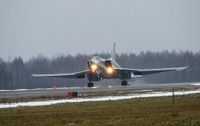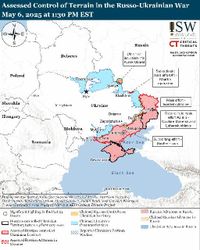On the night of May 7, 2025, a significant escalation in drone warfare was witnessed as multiple military airfields in Russia were targeted. Reports indicate that drones struck two key airfields: Shaikovka in the Kaluga region and Kubinka in the Moscow region. This event reflects an ongoing trend of drone attacks aimed at undermining Russian military capabilities, particularly in the context of the ongoing conflict with Ukraine.
According to Andrii Kovalenko, head of the Center for Countering Disinformation (CCD), the strikes were aimed at crucial military installations. "Two enemy airfields were hit," he stated, emphasizing the strategic importance of the targets. The Shaikovka airfield is home to Tu-22M3 bombers, which are capable of carrying Kh-22 missiles, while Kubinka hosts Su-27 and MiG-29 aircraft. Satellite images corroborate the reports, showing fires at both locations following the drone strikes.
Shaikovka is classified as a first-class military airfield and serves as the base for the 52nd Heavy Bomber Aviation Regiment, known for its involvement in high-profile attacks, including a missile strike on a shopping mall in Kremenchuk in June 2022. Kubinka, situated just 5 kilometers northwest of the town of Kubinka, has also been previously targeted, indicating a pattern of attacks aimed at degrading Russia's air power.
Earlier that night, around 2:00 a.m. Kyiv time, additional drone attacks were reported in and around Moscow. The Russian military claimed that many of these were intercepted, but debris from the interceptions fell in various locations, including the Kashirskoye highway. The Moscow mayor, Sergei Sobyanin, confirmed that seven drones were engaged by air defense systems, and emergency services were dispatched to manage the aftermath of these incidents.
This wave of drone strikes comes amid ongoing tensions and military operations in Ukraine, where Ukrainian forces have been conducting limited attacks across the international border near Tetkino and Novyi Put in Kursk Oblast. Reports from Russian military bloggers suggest that Ukrainian forces have made minor territorial gains in Tetkino, seizing control of several streets. Russian forces, including elements of the 83rd Airborne Brigade, have been deployed to counter these advances.
On May 6, 2025, a notable prisoner of war exchange took place between Ukraine and Russia, with both sides returning 205 individuals. Ukrainian President Volodymyr Zelensky expressed gratitude to the United Arab Emirates for facilitating the exchange, marking a rare moment of cooperation amidst the ongoing hostilities.
In a related development, Russian Security Council Secretary Sergei Shoigu published an op-ed in Rossiyskaya Gazeta, advocating for military and political unity against perceived threats from the West. He emphasized the importance of a centralized state ideology, drawing parallels to the Soviet Union's historical narratives. This rhetoric appears to be part of a broader strategy to consolidate public support for the ongoing conflict and reinforce a unified national identity.
Further complicating the political landscape, Chechen Republic Head Ramzan Kadyrov expressed a desire to resign from his post, stating that only President Vladimir Putin could approve such a move. Kadyrov, who has played a crucial role in stabilizing the North Caucasus region, has indicated that his health has been declining, leading to speculation about his future and the potential implications for Putin's regime if he were to step down.
As the conflict continues to evolve, the use of drone technology has become increasingly prevalent on both sides. Ukrainian forces have been utilizing drones for reconnaissance and targeted strikes, while Russia has been responding with its own drone campaigns aimed at Ukrainian infrastructure.
The recent drone attacks on military airfields in Russia signal an escalation in this aerial warfare, highlighting the vulnerability of even the most fortified military installations. As both sides adapt to the changing dynamics of warfare, the implications for the broader conflict remain significant.
In the wake of these developments, analysts are closely monitoring the situation, particularly as the Kremlin seeks to control the narrative surrounding its military operations and the ongoing conflict in Ukraine. The interplay between military actions and political rhetoric will likely shape the future trajectory of the war, as both sides prepare for what could be a prolonged engagement.
As the situation continues to unfold, the international community watches closely, aware that each drone strike and military maneuver could have far-reaching consequences not only for Russia and Ukraine but also for global security and stability.


